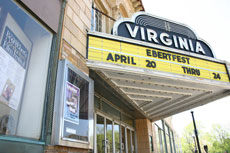Roger Ebert, celebrities visit C-U for Ebertfest

The Daily Illini
Apr 25, 2005
Last updated on May 11, 2016 at 08:49 p.m.
Champaign-Urbana welcomed the Eberts with a thunderstorm. When Roger and Chaz arrived at the Ebertfest Opening Gala on Wednesday night, the precipitation had progressed from a mere trickle to a steady rain. At 6 p.m. the traditional speeches that open Roger Ebert’s Overlooked Film Festival were forced off the President’s Mansion’s backyard by the torrential downpour and into a very cramped room.
After a ten-minute introduction and the presentation of his new Chancellor’s Medal, Roger Ebert took the mic, only to be interrupted so the city bigwigs could introduce him some more. They proclaimed it “Roger Ebert Day” in Urbana and Champaign, to which Ebert replied, “But it’s raining!” He then started introducing the festival’s guests and discussing some of the movies.
After twenty minutes of craning my neck to see what was going on and trying my best not to look sweaty or disheveled, I decided that I needed to find one of two things: a festival guest not currently being introduced by Roger, or a much cooler room.
I found both in Joe Soares, who was sitting in the doorway to the patio, talking with some associates of mine. I walked over and joined their conversation.
Get The Daily Illini in your inbox!
Joe is a retired wheelchair rugby player who coaches one of the teams that is the focus of the film Murderball (2005). When I walked up, he was talking about his wheelchair, which had a titanium bar on it that was bent by the baggage handlers at the airport. “There are two kinds of chairs,” he said, “The ones that break, and the ones that break often.
“We always laugh when a company comes out with a wheelchair and say that it’s indestructible. After you been on the road for six months, with Delta Airlines, America Airlines, et cetera, no wheelchair is.”
Joe lost the ability to use his legs to polio when he was very young, but he has always been athletic. He started with wheelchair basketball and moved on to tennis and rugby. In the latter he became one of the best players in the world. In his words, “I hate to lose at anything.”
In wheelchair rugby, he told us, it is illegal to reach for the ball, but any contact between chairs is perfectly legal. “They can throw you out into the third row if they want to – the rugby chairs are built like f***ing ‘Mad Max.'”
And so it is with images of quadriplegics racing through the desert in search of precious oil that I left the President’s Mansion and headed to the historic Virginia Theater, where the screening of the first movie, Jacques Tati’s Playtime (1967), was about to begin. As a slow-paced French film, I was worried about how the audience would react to it, but it proved to be a hit.
Murderball, which was the first show the next day, proved to be simultaneously exciting, touching and informative. As Roger put it, “There are many different approaches to this material, and this film seems to take all of them.”
After the next film, The Saddest Music in the World, I headed to the Green Room for dinner. I sat at a table with Jonathan Rosenbaum, the critic for the Chicago Reader who was the featured guest for Wednesday night’s Playtime.
Rosenbaum is an interesting critic in that neither The Aviator nor Sideways was included in his Top Ten of 2004 – in fact, he seems to detest Sideways, a critical favorite, with a passion. The conversation at the table was on a wide variety of topics, from the Coen brothers’ films (he seems to dislike almost all of them) to modern romance, or rather, the lack thereof.
The best film at the festival was probably Yesterday (2004), which played at 1 p.m. on Friday. It was made by a South African director named Darrell Roodt, who I had the pleasure of meeting briefly immediately after the film. Our meeting consisted only of me introducing myself and telling him how great his movie was before he wandered off to the Green Room, but it’s a great feeling, to tell a creator how much you appreciate his work.
Also on Friday was Baadasssss (2004), a movie by Mario Van Peebles about the making of Sweet Sweetback’s Baadasssss Song, a movie he starred in and which his dad directed in 1971. Van Peebles stars in the movie as his father, and was on hand afterward to discuss being Baadasssss.
He has a likable, electric persona that demands your attention. His thoughts on black cinema and the civil rights movement, as well as his own personal story of the making of both his movie and his father’s, are well thought-out, well articulated, and above all, fun to listen to.
For example: “Black people in movies used to be like Spock on ‘Star Trek.’ He was always bigger, stronger and faster than Kirk, but he never got laid on the Enterprise. Why? Because he didn’t have the Kirk ears.”
And my favorite line of the night? When discussing the casting for his Western, Posse (1993), van Peebles shared the astute observation that “there is always a Baldwin for your budget.”
The first thing I said to Jason Scott Lee when I met him at the after party was “Oh my God, you’re Mowgli?!” The actor is more famous for playing another Lee by the name of Bruce (no relation), but he was best remembered from my childhood as Mowgli in the live adaptation of Rudyard Kipling’s The Jungle Book(1994). He was here this weekend as a featured guest for Map of the Human Heart (1993), in which he plays an Inuit who is assimilated int English culture.
Map wasn’t my favorite movie at Ebertfest, but I felt there was one thing in it that was greatly overlooked – Jason’s performance. I tried to tell him this, but the man is almost ridiculously modest. “When you make something and see it years later, you can see all the flaws in it,” he said.
It was also hard to convince him that he is living the dream life. I’ll let you decide: after a few prolific roles in the nineties, Jason moved back to his native Hawaii, where he lives on a farm near the ocean. He goes fishing almost every day -“fishing is my life,” he said. When asked if he sells his fish, he said, “No, I give them away. It creates good community.” And then, if you accuse him of being one of the all-around best people you’ve ever met, Jason refuses to believe you.
Taal (1999) was to end the festival on Sunday, but the real climax of the festival was at the after party Saturday night. The food was great, the conversation was enjoyable and the musical numbers were entertaining. Yes, the musical numbers. Late in the party, it was decided that guests should request songs for the pianist to play and sing along. One guest sang a very good rendition of a soul song, and as for the other, let’s just say that I’ll never hear “On the Street Where You Live” the same way when I watch My Fair Lady (1964).
At one point in the evening, it was decided that Jason Scott Lee was the most photogenic person at the party. Everyone wanted a picture with him or of him. Ebert, playing with the camera phone he got less than a week ago (his first cell phone), began taking pictures, and soon Mario Van Peebles was turning his cell phone on, wanting to get in on the action. They were taking pictures not just of Jason, but of everything – they even took pictures of each other taking pictures of someone else. It was probably the most surreal moment of my life, watching Roger Ebert and Mario Van Peebles playing with their camera phones like excited teenagers.
I often cite last year’s showing of David Lean’s Lawrence of Arabia (1962) in 70 millimeter as the best time I’ve ever had at the movies. The past five days have topped that experience by far: several Festival veterans agree that this year was almost undoubtedly the Overlooked Film Festival’s best. As fatigue sets in from the 12 movies I’ve seen in the past five days, I have a new respect for people who make movies – I’m exhausted just from watching them.





